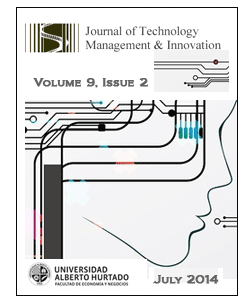Technological Interfaces of the Brazilian Shipbuilding and Offshore Industry
DOI:
https://doi.org/10.4067/S0718-27242014000200014Keywords:
Technological Interfaces, Naval and Offshore Industry, InnovationAbstract
The recent challenges of the Brazilian naval and offshore industry have generated a unique opportunity for studies on technological innovation and economic development. This paper presents the recent developments and future prospects of this industry under the theoretical framework of ‘technological interfaces’. Technological interfaces are defined as the thread of knowledge and technology necessary for establishing a transaction between two or more agents. It is both a theoretical construct and a tool for better understanding industrial coherence and dynamics. The development project of ship and platform construction in Brazil, unveils a potential dynamic similar to large national projects, such as the U.S. space project in the 50s. By establishing scientific parameters of analysis for the study, it is possible to generate a broader diagnosis of the technological interface matrix of the industry, but mainly it is possible to map the framework of operational gaps and the needs for technical-scientific development.Downloads
References
ALVES, A, C., Zen, A, C., Padula, A. D. (2011). Routines, Capabilities and Innovation in the Brazilian Wine Industry. Journal of Technology Management and Innovation 6 (2), 128-144. doi: http://dx.doi.org/10.4067/S0718-27242011000200009
BAIN, Joe S. (1956). Barriers to New Competition: Their Character and Consequences in Manufacturing Industries, Harvard University Press.
BALDWIN, C.Y, Clark, K. B. (1997). Managing in the Age of Modularity. Harvard Business Review, Sept/Oct, pp.81-93.
BRESCHI, S. and F. Malerba (1996), 'Sectoral Systems of Innovation,' in C Edquist (ed.), Systems of Innovation. Pinter London.
CARLSSON, B. and Stankiewicz, R. (1991). On the nature, function and composition of technological systems. Journal of Evolutionary Economics. (1), 93-118. DOI: http://dx.doi.org/10.1007/bf01224915
COASE, R. (1937). The nature of the firm. Economica, 4 (16), 386-405.
COASE, R. H. (1972). Industrial organization: A proposal for research. V.R. Fuchs (Ed.), Policy issues and research opportunities in industrial organization, National Bureau of Economic Research, New York.
DANTAS, E. Bell, M. (2009). Latecomer firms and the emergence and development of knowledge networks: The case of PETROBRAS in Brazil Research Policy (38) 829–844. DOI: http://dx.doi.org/10.1016/j.respol.2009.01.007
DE NEGRI, João Alberto et al. (2011) Poder de compra da Petrobrás: impactos econômicos nos seus fornecedores – síntese e conclusões. Brasília: IPEA.
DOLOREUX, D; Parto, S. (2005). Regional innovation systems: Current discourse and unresolved issues, Technology in Society, (27) 133-153.
DOSI, G. (1982). Technological paradigms and technological trajectories. Research Policy, 11: 147-162. DOI: http://dx.doi.org/10.1016/0048-7333(82)90016-6
FAVARIN, J. et al. (2008). Estratégias para a navipeças brasileira. In: Centro de Estudos e Gestão Naval. Available at Accessed in Dec, 17th, 2010.
FREEMAN, C. (1987). Technology Policy and Economic Performance: Lessons from Japan, London: Pinter.
HARLAND, C. (1996). Supply Chain Management: Relationships, Chains and Networks. British Journal of Management, Special Issue, (7) 63 – 80. DOI: http://dx.doi.org/10.1111/j.1467-8551.1996.tb00148.x
KNIGHT, F.H, (1921). Risk, Uncertainty and Profit (New York: Harper).
LANGLOIS, R., and Robertson, P. (1992). Networks and innovation in a modular system: Lessons from the microcomputer and stereo component industries. Research Policy, (21), 297–13. http://dx.doi.org/10.1016/0048-7333(92)90030-8
LANGLOIS, R, N; Robertson, P. L. (1995) Firms, Markets, and Economic Change: A Dynamic Theory of Business Institutions . London: Routledge.
LANGLOIS, R.N. (2003). The Vanishing Hand: The Changing Dynamics of Industrial Capitalism. Industrial and Corporate Change, 12 (2), 351-385. DOI: http://dx.doi.org/10.2139/ssrn.285972
LUNDVALL, B-Å. (ed.) (1992). National Systems of Innovation: Towards a Theory of Innovation and Interactive Learning, London: Pinter Publishers.
MALERBA, F. (2002). Sectoral systems of innovation and production. Research Policy (31) 247–264. DOI: http://dx.doi.org/10.1016/s0048-7333(01)00139-1
METCALFE, J.S., (1995). Technology systems and technology policy in an evolutionary framework. Cambridge Journal of Economics (19), 25–46.
NELSON, R.,Winter, S. (1982). An Evolutionary Theory of Economic Change. The Belknap Press of Harvard University Press, Cambridge, Ma.
NELSON, R. and Rosenberg, N. (1993). Technical innovation and national systems. In: Nelson, R. (ed). National innovation systems: a comparative analysis. New York, Oxford: Oxford University.
OLIVEIRA, A. (2009). Indústria Para-Petrolífera Brasileira Competitividade: Desafios e Oportunidades. Rio de Janeiro. Available at: http://www.ie.ufrj.br/datacenterie/pdfs/seminarios/pesquisa/texto1811.pdf. Accessed in Dec, 17th, 2010.
ONIP (2011). Oportunidades e Desafios da Agenda de Competitividade para Construção de uma Política Industrial na Área de Petróleo: Propostas para um Novo Ciclo de Desenvolvimento Industrial.
PORTER, M.E. (1985). Competitive Advantage, Free Press, New York.
PORTER, M.E (1998). Clusters and the new economics of competition. Harvard Business Review, 76 (6), 77-90.
RICHARDSON, George B. (1972). The Economic Institutions of Capitalism. Economic Journal, v. 82(327), 883-896.
ROSENBERG, N. (1983). Inside the Black Box: Technology and Economics. Cambridge University Press: Cambridge.
WILLIAMSON, O. E. (1985). The Economic Institutions of Capitalism. The Free Press: New York.
WILLIAMSON, (1991). "Strategizing, Economizing, and Economic Organization". Strategic Management Journal 12 (special issue). DOI: 10.1002/smj.4250121007
ZAWISLAK, P.A. (2004). “From the ‘Dream of Opportunities’ to the ‘Nirvana of Trust’: issues for a framework on cooperative agreement stability”. READ, Porto Alegre, 34(6).
ZAWISLAK, P. A; Alves, A. C.; Tello-Gamarra, J.; Barbeux, D.; Reichert, F. M. (2012) Innovation Capability: From Technology Development to Transaction Capability. Journal of Technology Management & Innovation. Volume 7, Issue 2. p. 14-27. DOI: http://dx.doi.org/10.4067/S0718-27242012000200002
Downloads
Published
How to Cite
Issue
Section
License
Copyright (c) 2014 Journal of Technology Management & Innovation

This work is licensed under a Creative Commons Attribution-ShareAlike 4.0 International License.







